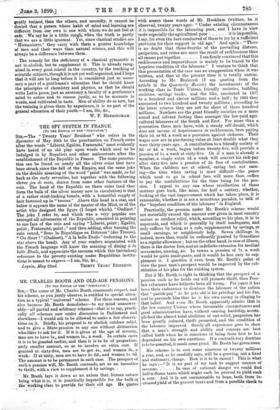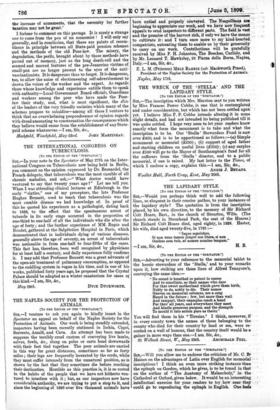MR. CHARLES BOOTH AND OLD-AGE PENSIONS.
. (TO THE EDITOR Os' THE "SPECTATOR"] e Sin,—The name of Mr. Charles Booth commands respect, and his scheme, as you justly observe, is entitled to special atten- tion as a typical " universal " scheme. For these reasons, and • also because Mr. Booth demolishes—to my mind unanswer- partial and arbitrary schemeS—that is to say, practi- cally all schemes now under discussion in Parliament and elsewhere-1 would ask to be allowed to make a few• observa- tions on it. Briefly, his proposal is to abolish outdoor relief, and to give a State-pension to any one without distinction who:likes to ask'forit. . If it is given at the age of seventy, men are to have 7s., and women es., a week. In certain cases it is to be granted earlier, and then it is to be of proportion- ately smaller amount, so as to involve no extra cost. If granted at sixty-five, men are to get 4s., and women 3s., a week: .If at,sixty, men are to have 2s. 6d.5 and won:len ls. 9d.
• The amount is to be permanent in-each case. The prospect of such. a pension will, Mr. Booth contends, act as an incentive, • to thrift,, with a view to supplement it by savings. • Mr. Booth -Jays it down as an akiem..that, human nature being whit it 'is priotically impaisible for the bulk of 'working bliss to prbvide for.'their" old- age. He quotes ... • . with assent these words of Mr. Hookham (written, . be it observed; twenty years ago): " Under existing circumstances it is impossible for ,the labouring poor, and I have in view mote especially the agricultural poor . . . . . it is impotSible, I say, for even the best-conducted of these to lay by a sufficient provision for their support in old age." And again : " There is no, doubt that three-fourths of the prevailing distress, pauperism, and crime are more the result of recklessness than all causes put together I am firmly convinced that this recklessness and improvidence is mainly to be traced to the hopeless condition of the labourer." I venture to think that this presentation of the case was an exaggeration when it was written and that at- the present time it is totally untrue. According to Mr. Brabrook (I am quoting from the article in the Quarterly Review) the investments 'of the working class in Trade Unions, friendly societies, building societies, savings banks, and the like, amounted in '1877 to a hundred and eleven millions and a half ; b'y 1891 they amounted to two hundred and twenty millions ; according to the latest returns they are not far short of .three hundred millions. Nowhere are the great friendly societies on a more sound and solvent footing than amongst the low-paid agri- cultural labourers of the South and East: For more than a generation these men have, with a steady self-denial, which does not savour of hopelessness or recklessness, been paying their 5d. or 6d. a week as a provision against sickness. Their wages now are in purchasing value at least double what they were thirty years ago. , A contribution to a friendly society of 3d. or 4d. a week, begun before twenty-five, will provide a pension of 5s. a week at sixty-five. Or if a man is already a member, a single extra ld. a week will convert his sick-pay after sixty-five into a pension of 5s. free of contributions. When the, children are at school, eating but not earn- ing—the time when saving is most difficult—the pence which used to go in school fees will more than suffice to pay the contributions for the time being for the pen- sion. I appeal to any one whose recollection of these matters goes back, .like mine, for half a century, whether, looking at the vast improvement which has taken place, it, is reasonable, whether it is not a monstrous paradox, to talk of the " hopeless condition of the labourer" in England.
Practically, the pension under Mr. 'Booth's scheme would not materially exceed the amount now given in most country unions as outdoor relief, which, according to his-plan, it is to supersede, and which is generally by itself inadequate, and only suffices by being, as a_ rule, supplemented by savings, or small earnings, or neighbourly help. Seven shillings is, indeed, more than would be ordinarily 'granted by Guardians as a regular allowance ; but on the other hand, in case of illness, there is the doctor free, and an indefinite extension for medical necessaries, nursing, Sac. _ In towns a pension of 7s. a week would be quite inadequate, and it would be less easy to sup- plement it. I question if even from Mr. Booth's point of view the poor man's prospect would be improved by the sub- stitution of ,his plan for the existing system.
But if Mr. Booth is right in thinking that the prospect of a pension such as he holds out will promote thrift, then Poor- law hitherto been all wrong. For years it has been their endeavour to disabuse the labourer of the notion that " parish-pay " as he gets old is his privilege and his due, and to persuade him that he is his own enemy in clinging to that belief. And even Mr. Booth apparently admits that in the few country Unions where favourable circumstances and good administration have, without causing hardship, accom- plished the almost total abolition of out-relief, pauperism has been greatly reduced, thrift promoted, and the condition of the labourer improved. Surely all experience goes to show that a man's strength and ability and courage are' best called forth when he is conscious of being from first to last dependent on his own exertions. If a contradictory doctrine is to be. asserted, it needs some proof. Mr. Booth has given none.
His scheme is to cost. some nineteen or twenty millions a year, and, as he candidly says, will be a growing, not a fixed and stationary, charge. How is it to be raised 4 This is what he says:—" It is no • part of my task to suggest sourcea of revenue " In' ease of national danger we could find half-a-dozen taxes which might each be pressed to yield such a sum. And it is not unreasonable to hope, both from in- creased yield of the present taxes and from a possible check to the increase of armaments, that the necessity for further taxation may not be great."
I forbear to comment on this passage. It is surely a strange one to come from the pen of an economist ! I will only say generally, and in conclusion, that there are points of resem- blance in principle between all State-paid pension schemes and the methods of the old Poor-law. The misery, the degradation, the perils, brought about by those methods have passed out of memory, just as the long death-roll and the seamed and marred features of the pre-Jennerian victims of small-pox are no longer present to the eyes of the anti- vaccinationists. It is dangerous thus to forget. It is dangerous, too, to allow the noise of electioneering self-advertisement to drown the voices of the worker and the expert. As regards those whose knowledge and experience entitle them to speak with authority—Local Government Board officials, Guardians and workers among the poor who have made the Poor- law their study, and, what is most significant, the elite of the leaders of the very friendly societies which many of the schemes propose to subsidise—among all these I venture to think that an overwhelming preponderance of opinion regards with dread amounting to consternation the consequences which they believe would ensue from the establishment of any State- paid scheme whatsoever.—I am, Sir, &e., Hechfield, Winchfield, May 23rd. JOHN MARTINEAU.







































 Previous page
Previous page